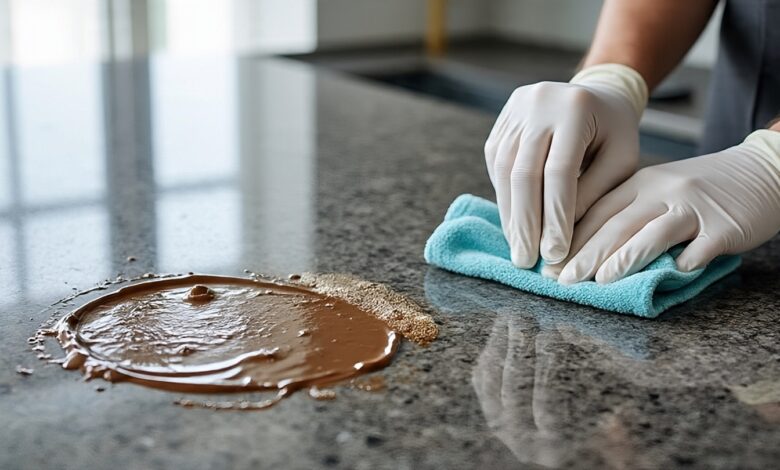How to Remove Stubborn Stains from Granite Surfaces
Granite countertops add beauty and durability to any space. Learn expert tips for stain removal, care, and maintenance from pros in Pittsburgh, PA.

Key Takeaways
- Granite countertops are durable and visually appealing, but can develop stubborn stains if not properly cared for.
- Prompt action, safe cleaning methods, and preventive measures are essential to maintain beauty and longevity.
- DIY solutions and commercial granite cleaners can remove most stains, but always use granite-safe products.
- Regular sealing, gentle maintenance, and protective practices prevent future damage and preserve countertop value.
Granite countertops are celebrated for their elegant appearance and remarkable resilience, making them popular for kitchens, bathrooms, and other living spaces. Beyond aesthetic appeal, granite offers durability that withstands heavy daily use. However, even the strongest granite surfaces can fall victim to stubborn stains, which may leave discoloration, dull patches, or unsightly marks. Ignoring or mishandling these stains can diminish the countertop’s beauty and compromise the long-term value of your investment. Homeowners seeking expert guidance—whether for installation, restoration, or maintenance—can consult professionals like those offering countertops Pittsburgh, PA services to ensure proper care and preservation.
While everyday granite maintenance is relatively simple—often requiring only gentle wiping—unexpected spills and mishaps are inevitable in busy households. Acting quickly is essential to prevent stains from setting into the stone. Knowing the best cleaning techniques, DIY remedies, and preventive measures will help maintain your countertops’ vibrancy and durability for years. Timely intervention is key to preserving granite surfaces’ functionality and aesthetic charm.
Why Granite Needs Special Care
Granite is naturally durable, resisting scratches and heat. However, its porous nature makes it susceptible to staining if spills are not promptly addressed. Additionally, certain cleaning agents, especially acidic or abrasive solutions, can erode the protective sealant applied during installation, leading to dullness and increased vulnerability to future stains. Consumer Reports emphasizes the importance of avoiding harsh cleaners, which can chemically etch the surface and leave permanent marks, altering the natural pattern and luster of the stone.
Safe cleaning routines preserve visual appeal and promote hygiene by preventing bacteria and food particles from settling in micro-fissures. Properly cared-for granite ensures a clean, safe, attractive environment in high-traffic areas like kitchens and bathrooms.
Common Causes of Granite Stains
- Oily substances: Cooking oils, grease, and fatty foods can penetrate the granite pores, creating persistent dark marks.
- Acidic liquids: Coffee, wine, fruit juices, and tea can etch or stain the surface if left untreated.
- Ink and pigments: Permanent markers, pens, and paint can leave deep-set discoloration.
- Rust and water deposits: Hard water or contact with metal items can produce orange or cloudy stains.
- Household chemicals and cosmetics: Nail polish, makeup, and cleaning agents may cause stubborn spots if not immediately removed.
Immediate Steps When a Stain Occurs
Acting quickly is critical. Blot, rather than rub, the spill with a paper towel or microfiber cloth to prevent deeper penetration. Rinse with warm water and a pH-balanced soap or granite-specific cleaner, then dry thoroughly to prevent water rings. Trusted guides, such as those in Architectural Digest, provide expert tips for long-lasting care and proper sealing techniques, ensuring the stone’s integrity remains intact.
DIY Stain Removal Solutions
For stubborn stains, homemade remedies often suffice:
- Paste preparation: Mix a paste specific to the stain—baking soda and water for oil-based stains; hydrogen peroxide and water for organic stains like wine or coffee.
- Application: Spread the paste on the stain, cover with plastic wrap, and seal the edges to encourage lifting.
- Waiting period: Let the paste sit for 24 hours, then remove and rinse. Repeat as necessary.
Using Commercial Cleaners
If home remedies fail, use commercial granite cleaners. Always ensure they are granite-safe, testing a small, inconspicuous area first. Avoid general-purpose cleaners, ammonia, or bleach, which can strip sealants and damage the stone.
Tips to Prevent Stubborn Stains
- Apply a granite sealer every 6–12 months for protection.
- Clean spills promptly, especially oily or acidic substances.
- Use coasters, trivets, protective mats under beverages, hot pans, and chemical containers.
- Stick to pH-neutral or stone-specific cleaners with soft cloths to preserve the finish.
Common Mistakes to Avoid
Avoid vinegar, lemon juice, abrasive pads, bleach, or ammonia, as these can weaken or etch the surface. Neglecting regular sealing allows stains to penetrate and damage the countertop over time.
Long-Term Maintenance Tips
Maintain a weekly cleaning routine with gentle, stone-safe solutions. Inspect the countertop periodically for cracks or dullness and reseal as needed. Educate household members on safe practices to ensure the granite remains in optimal condition. Resources such as the Wirecutter guide provide evidence-based advice for effective countertop care.
Conclusion
Stubborn stains on granite countertops can be managed effectively with quick action, proper cleaning, and preventive maintenance. By combining daily care, occasional deep treatments, and periodic sealing, homeowners can preserve their granite surfaces’ beauty, durability, and value for decades. Whether using DIY methods or professional-grade products, understanding how granite reacts to various substances and following best practices ensures that your investment continues to enhance your home’s aesthetic and functionality.











